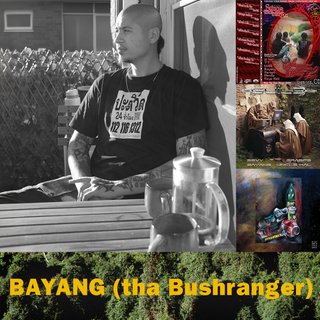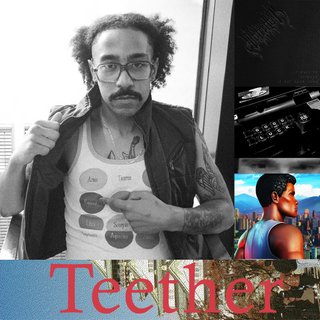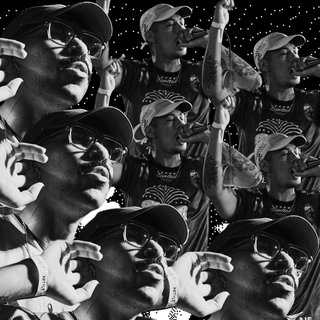“Man, if you're a real estate agent, like, go f**k yourself.”
It’s an innocuous Saturday afternoon in August, yet somehow, uncomfortably, it feels like a classic Sydney summer day. Completely unrelenting, the heat has nowhere to go except endless, wide concrete streets and red-bricked apartment blocks. It sits, unmoving. Stifling and heavy.
“I mean, they're f**king called ‘Colonial Real Estate'! It's just f**king like, come on.”
Nestled on a balcony in his South West Sydney apartment, the sun shines directly on BAYANG (tha Bushranger)’s face; less a halo, more a white-hot spotlight. He meets it directly, gazing out to the near and distant city sprawl. Squint hard enough into that sun-baked haze, and you can almost hear the opening lines to REDBRICKGOTHIK, BAYANG’s collaborative album with Sydney noise band BRACT.
“This city is alive / Cancerous clump of cells on sunburnt land / Malignant tumour / Exponential growth / We stomp in rhythm to its jackhammer heartbeat / Festival of saltwater and concrete.”
REDBRICKGOTHIK is BAYANG’s answer to a question that he and many of his peers are grappling with: what does it mean to make hip-hop in a place like ‘Australia’ – a country built and sustained on genocide and mass dispossession? It’s a record that uncovers the ugly, honest face of the “heart of the colony,” as BAYANG puts it, “a quite illogical and unlivable city.” In Sydney, they landed, spread, and wiped out everyone in their way. 236 years later, slowly melting in its messily planned suburban monuments gives the feeling of being somewhere wrong, somewhere that shouldn’t exist.
On REDBRICKGOTHIK, BAYANG is a vengeful guardian angel, lamenting the ‘broken covenant’ of his fallen ‘Babylon’. Beneath him burns BRACT’s demonic concoction of industrial hip-hop, doom-laden noise and furiously kinetic gabber; the streets themselves are speaking. It’s a hauntological hip-hop, urban poetry personified.
The record is held dearly by many in Sydney, an unironic ‘cult classic’. It's not uncommon to see album merch at not only hip-hop, but also punk and club gigs. Released on respected local punk label Black Wire Records, and peppered with nods to a resilient history of ‘Australian’ DIY music (such as Mark N’s famed breakbeat hardcore label on the song ‘BLOODYFIST’) REDBRICKGOTHIK mythologises Sydney not by deifying it, but by being a voice for it’s undergrowth: the weeds, always struggling against being trampled underfoot in this strange, at times ugly city.
“In the midst of that [struggle], you have the blues, you know? It’s always been the blues, but you have 2024’s iteration of the blues, which is this persistence of spirit and the romance of the everyday…. The indomitable human spirit [laughs] that refuses to just shut up. And I think hip-hop's a beautiful medium for that, and probably carries that torch better than any other scene at the moment.”
BAYANG is a torchbearer himself, a role he bears seriously yet unpretentiously. Formerly the vocalist of anti-colonial black metal band DISPOSSESSED, he was drawn towards hip-hop as an even more “raw” expression of identity and artistry.
“That's what I love about [hip-hop]. It pushes you towards something better. Being in metal was great because you could embody your character. There's something really fun about being like, ‘I'm an orc!’ Like, that's great. But hip-hop, there's a real drive in it.
“James Baldwin said that the process of being an artist is basically — I'm paraphrasing really badly — the process of like, discovering the real. The real human. So I feel the more I create, the more closer I get to who I am.”

Featured releases: STINGA Tour Diary '24: Tape Vol 1 (2025), GUILD (2024), REDBRICKGOTHIK (2023)
BAYANG’s first verse came on ‘Sleep Debt’, a song on Melbourne rapper Teether’s album DESERT VISUALS. The two met when BAYANG was playing in Melbourne with DISPOSSESSED, both already big fans of each other’s work.
“I would have been like 19, 20 at the time… This really weedy, lanky dude walks up holding a skateboard with dreads down to his butt. He's like, “hey, what's up, I'm Teether.” I was like, “you're in f**king Too Birds.” And he was like, “you're the first person outside of Melbourne who has ever said that.””
Recorded in one take in BAYANG’s car, ‘Sleep Debt’ is the early germ of a relationship between two artists with a strong sense of place. On it, BAYANG’s early, furtive memories and dreams that are ‘too big for this city’ slot seamlessly alongside Teether’s already distinguished, observational yet hazy style.
While there’s notes of the smoke encrusted rap of New York's Backwoodz Studioz roster (Teether scored a billy woods verse after a chance after-show meeting in Los Angeles) or Earl Sweatshirt (who wasn’t influenced by Earl?), Teether’s voice is undoubtedly distinct: both literally (seriously, find a better baritone voice) and artistically. He carries himself with a measured weariness, and each phrase is pondered, held up to the light with a raised eye. It’s proper real heads music, with a satisfying literariness, through dark humour and imagery pulled from the everyday.
“I think metal lyrics started it for me, because you'd have a 10 minute track and the lyrics would be like a paragraph long… I feel like they had to be good. You had to be able to read it in a way that it looked good in the artwork and like a book in the booklet. So I always wanted [my lyrics] to read well. If I have to read the lyrics and it makes me cringe, I'm like, ‘I better rewrite this’.”
Teether has built a legacy as one of the most accomplished and respected figures in ‘Australian’ underground rap; with a range of solo projects, collaborations including expansive club-ready records with producer Kuya Neil, and even more experimental electronic, deep-fried internet, end-of-history-hijinx with rap group Too Birds (plus a couple of black metal side projects for good measure). All still carry his unique, grounded perspective of art and its creation, just viewed from different angles. He calls his solo material, usually self-produced and sample-based, “my old man music. I'll just be inside. Usually make it when I'm depressed.”
He produced his latest record It Must Be Strange to Not Have Lived almost entirely himself, using a guitar and a Roland SP-404. It feels like an opus; a disorienting, murky world of wobbly, dubby guitars, glam metal outros and crashing ambient/club soundscapes. How do you even properly wrap your head around something like ‘In A Cube,’ a lowest-of-lo-fi thrash metal beat that Teether half raps, half howls over.
“I wanted to try to fuse every influence and every genre that had inspired me together into one project…Different sounds, but I think it's the same energy, and it comes from the same place.”
In a press release alongside the record, Teether wrote that, ‘No one but the traditional custodians and First Nations people of Australia have any real connection to this place...I think we have to represent that sense of disconnection in the music we make.’
“Yeah, that's cool. I forgot I said that [laughs].”
Like REDBRICKGOTHIK, It Must Be Strange… welds a unique sonic identity that embodies that dislocation – one with touchpoints, but still its own confused creation. On its stunning title track, sonically akin to a a lo-fi-beat-to-study-to version of those classic metal ballads that Metallica would do like once an album, an autotuned Teether croons, “I know it’s strange to have been here / I must know not what I do / Do you think somehow we’ll stay here? / Do you hear those whispers too?” Singing again on the forlorn ‘Too See the Dusk’ he has a vibe that’s almost… blues-like.
Three years on from ‘Sleep Debt,’ Teether returns the favour in sorts by providing the closing moments on REDBRICKGOTHIK. One of many linkups and verses traded over the years, it’s a relationship that means a lot to BAYANG.
“It felt like a real, I am not alone kind of moment. Because there were artists I followed, and I really liked them. But there wasn't that personal relation, that “oh, you're kind of rapping from where we are,” [from] the weirdo outskirts of first and second gen migrants…Working class. Maybe a bit mentally ill. Maybe a bit nerdy. Not very tough. [laughs]”

Featured releases: Soul of Too Birds (2023), STRESSOR (2023), It Must Be Strange To Not Have Lived (2024)
Within the same year that ‘Sleep Debt’ was recorded, BAYANG (tha Bushranger) put out his first record, a collaborative EP with Sevy, now one of Sydney’s most underrated and sprawlingly unique artists (the two first met at a Baro Sura and UV boi (now Skin on Skin) show at the Oxford Art Factory, and became roommates). notfromhere was released in 2020 through independent Sydney label TRACKWORK, a then new venture from producer and labelhead UTILITY, real name Austin Benjamin.
Previous production opportunities for Austin had been limited mostly to beat packs shipped unceremoniously overseas, or more experimental, ‘student of the game’ art projects; like Nexus Destiny, an MCA show with producer T Morimoto (who shared the UTILITY alias at the time), made up of 60 arpeggios made on presets used by Chicago and Atlanta producers that inspired them both. For him, meeting BAYANG and Sevy was a breakthrough of sorts, but notfromhere wasn’t the first release on the TRACKWORK label. Instead, its story starts with a 17 year old Gamilaraay kid from Inverell, and BAYANG’s chance meeting with him at a Koori Cup Knockout fundraiser.
“I told this story to lil ket recently while we were on tour. Because he was going, “bro, you know we used to pump T-Breezy when we were pumpin cones in the f**king shed.” And I was like, “that's crazy, because I discovered T-Breezy in a shed in Blacktown.””
BAYANG wasn’t much older at the time, still “only six months into this shit”, but a small act of kindness gave T-Breezy a chance to find his voice.
“Me and Sevs kind of just go off to the side and smoke a joint, like start rapping in the shed, just having fun. And I see this really quiet kid in the corner… but he's really paying attention, right? And I'm like, “wait, come over here brah. Come over, like spit something.””
Austin remembers when BAYANG and Sevy brought T-Breezy to his studio soon after.
“I think it was his first or his second day out of juvie. He had all this stuff written… all of a sudden he was like, “do you reckon I could try something on that beat?” And he hopped in and everyone's like, “what the fuck, who is this kid?” [laughs]. He sounded like Pressa or something. Like I put some auto-tune on him and we were like, this is incredible. So Sevy and BAYANG left and then Breezy just kept calling and visiting the studio, and it was just me and him, pretty much every day.”
T-Breezy had never before worked in a professional music setting, but his drive and synergy with UTILITY resulted in 2360; a blisteringly strong debut EP, in 2019. Alluringly gritty, and bolstered with deft but whip-ready trap production, it stood unique amongst an 'Australian' rap scene mostly focused on drill at the time. Five years later, Breezy released Souths Most Wanted, a debut, collaborative mixtape with his brother and close creative partner, Walkerboy.
Playing the blues continues in Part 2 - read on here:
Words by Lindsay Riley. Graphics by Rafael Enriquez
